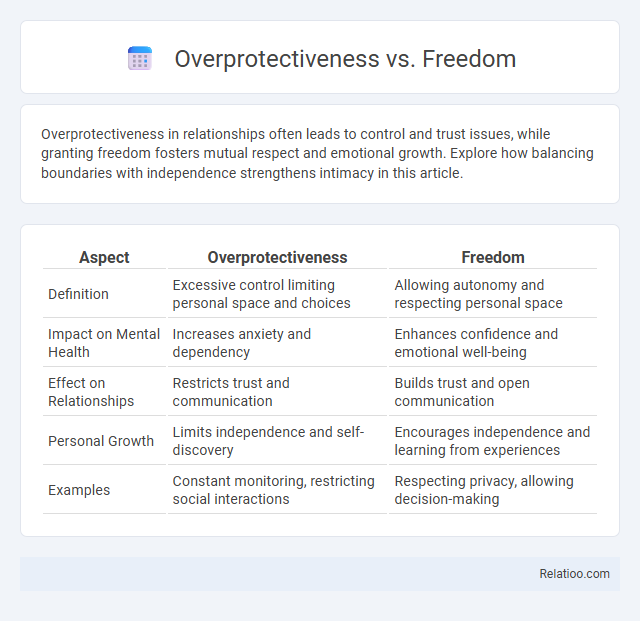Overprotectiveness in relationships often leads to control and trust issues, while granting freedom fosters mutual respect and emotional growth. Explore how balancing boundaries with independence strengthens intimacy in this article.
Table of Comparison
| Aspect | Overprotectiveness | Freedom |
|---|---|---|
| Definition | Excessive control limiting personal space and choices | Allowing autonomy and respecting personal space |
| Impact on Mental Health | Increases anxiety and dependency | Enhances confidence and emotional well-being |
| Effect on Relationships | Restricts trust and communication | Builds trust and open communication |
| Personal Growth | Limits independence and self-discovery | Encourages independence and learning from experiences |
| Examples | Constant monitoring, restricting social interactions | Respecting privacy, allowing decision-making |
Understanding Overprotectiveness and Freedom
Understanding overprotectiveness involves recognizing how excessive control can limit a child's ability to develop independence and decision-making skills. Freedom, when balanced correctly, fosters resilience, creativity, and self-confidence by allowing individuals to explore and learn from their experiences. Your approach should aim for a healthy balance, promoting safety without stifling personal growth or autonomy.
The Roots of Overprotectiveness
Overprotectiveness often stems from deep-rooted fears and anxiety about your child's safety and future, driven by a desire to shield them from harm and failure. Psychological factors such as past trauma, parental insecurities, and societal pressures contribute to excessive control that limits freedom and hinders independence. Understanding these roots helps balance nurturing care with granting your child the freedom necessary for healthy development and resilience.
Benefits of Granting Freedom
Granting freedom fosters autonomy, critical thinking, and self-confidence in individuals, promoting healthy emotional and cognitive development. It enables risk-taking and learning from experiences, which are essential for resilience and problem-solving skills. Balancing freedom with guidance ensures a supportive environment that nurtures independence without compromising safety.
Risks Associated with Overprotectiveness
Overprotectiveness in parenting or relationships can hinder emotional growth and independence, leading to increased anxiety and dependence. Excessive control limits opportunities for learning from mistakes, undermining resilience and critical decision-making skills. These risks create long-term challenges in self-confidence and personal development.
How Freedom Shapes Independence
Freedom fosters independence by allowing individuals to make choices, learn from mistakes, and develop critical thinking skills essential for personal growth. In contrast, overprotectiveness can hinder this process by limiting exposure to challenges and reducing opportunities to build resilience. Embracing freedom enhances self-confidence and decision-making abilities, which are crucial components of a healthy, autonomous life.
Striking a Balance: Protection vs Autonomy
Striking a balance between overprotectiveness and freedom is essential for fostering healthy development and resilient decision-making skills. Excessive protection can hinder Your growth by limiting opportunities to learn from mistakes, while too much freedom may expose You to unnecessary risks. Prioritizing clear boundaries that encourage autonomy while ensuring safety enables a supportive environment where independence and security coexist effectively.
Impact on Emotional and Social Development
Overprotectiveness can hinder Your emotional resilience by limiting opportunities to face challenges and develop problem-solving skills, leading to increased anxiety and dependence. Freedom fosters social development through experiential learning, enabling You to build confidence, independence, and meaningful relationships. Balancing protection and autonomy is crucial for optimal emotional growth and social competence.
Overprotectiveness in Parenting Styles
Overprotectiveness in parenting often limits a child's ability to develop independence and problem-solving skills, resulting in reduced self-confidence and increased anxiety. Your efforts to shield your child from failure can inadvertently hinder their emotional growth and resilience. Balancing protection with freedom is essential to foster healthy development and autonomy in children.
Encouraging Responsible Decision-Making
Encouraging responsible decision-making involves balancing overprotectiveness and freedom to foster independence while ensuring safety. Providing Your child with clear guidelines and the opportunity to learn from their experiences promotes critical thinking and accountability. This approach helps develop confidence and sound judgment essential for navigating complex situations.
Navigating Overprotectiveness in Modern Society
Navigating overprotectiveness in modern society requires balancing safety concerns with individual autonomy to foster healthy personal development and resilience. Excessive surveillance and control can hinder creativity, social skills, and emotional growth, while granting appropriate freedom cultivates independence and critical thinking. Understanding psychological impacts and promoting open communication enables families and educational systems to create supportive environments that empower rather than restrict.

Infographic: Overprotectiveness vs Freedom
 relatioo.com
relatioo.com